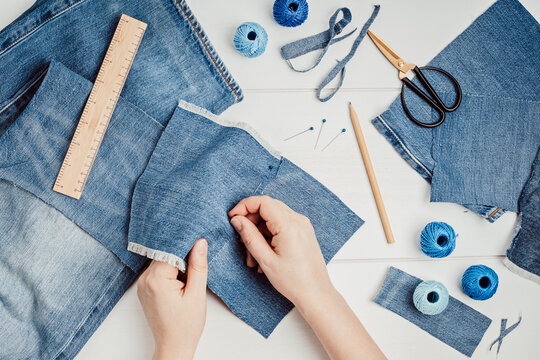Reimagining Wardrobes: A Considered Guide to Upcycling and DIY Sustainable Fashion
6/4/20253 min read


In an era marked by overconsumption and climate urgency, fashion is undergoing a necessary shift—from the thrill of acquisition to the art of preservation. Upcycling and DIY sustainable fashion are not merely trends but responses to a system that has, for too long, prioritized profit over planet and creativity over consciousness.
Today, thoughtful consumers are turning to their wardrobes not just as spaces of self-expression, but as sites of transformation. Upcycling—repurposing existing garments into new, functional pieces—offers both a practical and poetic solution to fashion’s waste crisis. When done with intent, it holds the power to redefine not only what we wear, but how we value clothing.
Why Upcycling Matters
At its core, upcycling is about honouring the materials we already own. It is a rejection of disposability and a return to craft.
Environmental Integrity: Reduces textile waste, curbs landfill overflow, and lowers reliance on virgin resources.
Economic Mindfulness: Empowers individuals to extend the life of their wardrobe without constant consumption.
Creative Engagement: Restores a tactile connection to our garments, inviting innovation through constraint.
Support for Circular Systems: Aligns with a regenerative fashion economy—one that values repair, reimagination, and longevity.
This movement also reflects a deeper cultural shift: from seasonal excess to sustainable permanence.
Emerging Conversations in Conscious Fashion
Across digital and local ecosystems, interest in DIY and upcycled fashion is gaining momentum. Key conversations shaping the discourse include:
Responsible design with existing materials
DIY as a form of fashion activism
Thrift store reinvention and secondhand luxury
Upcycling as a design methodology
Skill-sharing through workshops and community exchanges
These themes are not isolated; they form the language of a fashion future built on stewardship, storytelling, and substance.
Quiet Transformations: Approaches to Upcycling
Upcycling is not bound by aesthetics or trend—it is inherently democratic. Below are timeless methods to consider:
Denim Revisioning: Tailor aged jeans into structured skirts or refined shorts
Garment Painting: Use natural or sustainable dyes and fabric paints to renew cotton or linen pieces
Textile Conversion: Repurpose worn knits into scarves, gloves, or patchwork accessories
Functional Reuse: Turn oversized shirts into wrap tops or tunics
Embellishment with Intention: Introduce embroidery, lace, or salvaged fabric remnants to refine silhouettes
Each piece becomes more than a garment—it becomes an archive of care, intention, and time.
Upcycling for Warmer Seasons: Elevated DIY for Summer
Summer invites lighter fabrics and relaxed silhouettes, making it a prime season to explore garment reinvention:
Trousers into Tailored Shorts: Create bespoke finishes through refined stitching and hemwork
Patchworked Elegance: Construct soft cotton tops using tonal or monochrome fabric remnants
Artful Dyeing: Embrace plant-based dyeing to create one-of-a-kind tonal gradients
Utility Projects: Reimagine old bedsheets into minimalist picnic throws or Japanese-inspired carryalls
These projects echo the values of slow living—utility, beauty, and purpose, all in harmony.
Building Knowledge Through Community
Upcycling is as much about process as it is about practice. It thrives within community frameworks that value shared learning:
Skill-Sharing Workshops: Local upcycling sessions by artisans, independent designers, or NGOs
Online Communities: Global platforms hosting digital challenges, tutorials, and idea exchanges
Fashion Schools & Labs: Educational institutions promoting circular design and material innovation
Such spaces are not only technical but deeply cultural—preserving traditional techniques while fostering new systems of fashion education.
Considerations for Meaningful Upcycling
To approach upcycling as a discipline rather than a craft project, consider the following:
Start with Respect: Evaluate the fabric quality, seams, and history of each garment
Work with Intention: Design with utility and longevity in mind—not just novelty
Invest in Tools: Sustainable fashion begins with care—sharp shears, strong thread, and eco-conscious materials
Engage with Inspiration: Follow thought leaders in slow fashion, material design, and climate-conscious art
True upcycling does not rush—it refines. It is a reminder that fashion’s highest form is not speed, but stillness.
A Gentle Rebellion
In choosing to upcycle, we participate in a quiet rebellion—against planned obsolescence, against environmental neglect, against passive consumption. We reframe clothing not as disposable but as worthy—of repair, of reinterpretation, of reverence.
Upcycling is not a compromise. It is a couture of conscience. A philosophy that honours the past, transforms the present, and protects the future.
Join the conversation. Share your upcycled pieces using #RewearWithPurpose
or tag us @UnleashFashion_ to be featured in our conscious style stories.
